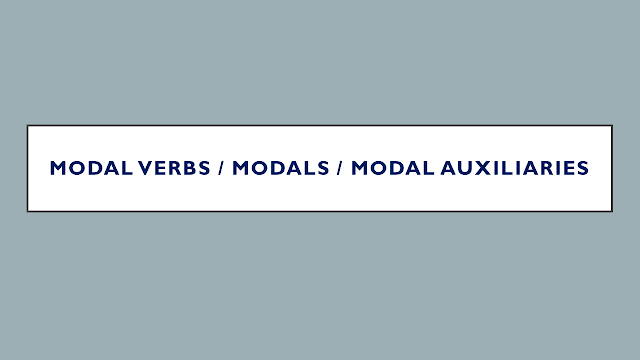Modal Verbs / Modals /
Modal Auxiliaries
PART 3
Special
auxiliaries
ü In
modern English, ‘shall’ has generally been replaced by ‘will’. In the past, ‘shall’
was used as the first-person form of ‘will’ to express the future tense.
Nowadays, ‘shall’ is usually used in a context where the speaker wishes to
sound very polite or very formal.
ü When ‘shall’
and ‘will’ are used in questions, however, their meanings differ greatly. ‘Will’
indicates the future tense, while ‘shall’ (when used before I or we) means that
the speaker is making a suggestion or asking someone else whether he or she
agrees with the suggestion being made.
Will
we drive to the nearest gas station?
Will
we get a cup of tea?
Shall
we drive to the nearest gas station?
Let’s go, shall we?
‘Let’s
(let us)’ and ‘why
don’t’ are modal auxiliaries that are used to make suggestions or friendly or
polite commands.
Let’s
go to a movie.
Why
don’t you pick me up at eight or so?
The progressive forms of modal auxiliaries
ü The present progressive form of a modal auxiliary is
composed of a modal auxiliary + be + verb form ending in -ing. The meaning
consists of the meaning of the modal auxiliary and that of the present-tense
progressive form of the verb. In the example below, the speaker wonders (may) whether Sophie is
resting.
We should probably come back later. Sophie may be resting.
In the example below, the speaker believes (must) that the store is closing.
The lights inside are being turned off. The store must be
closing.
ü The past progressive form is composed of a modal
auxiliary + have been + verb form ending in -ing. The meaning consists of the
meaning of the modal auxiliary and that of the past-tense progressive form of
the verb.
In the example below, the speaker suspects (might) that Diana was sleeping in.
Diana wasn’t at church today. She might
have been sleeping in.
In the example below, the speaker believes (must) that Paul was studying all night.
Paul looked tired this morning. (e must have been
studying all night.
ü By using a modal auxiliary, a speaker is choosing to express
a degree of certainty or uncertainty. The degree of certainty reflects how sure
the speaker is of something happening or how true his or her statement might
be. If the speaker is sure of something, he or she doesn’t use a modal.
He is sick.
ü If the speaker wants to express a strong degree of
certainty, he or she uses ‘must’.
He must be sick.
If the speaker wants to express a weak degree of
certainty, he or she uses ‘may’, ‘might’, or ‘could’:
He may be sick.
ü The distinction between two forms of modal auxiliaries
needs to be clarified: used to and be used to. Used to expresses a ‘habitual past’, an activity or a situation that existed
in the past but no longer exists. It is formed by using used to + base form of
the verb.
Alfred used to work for IBM.
My family used to vacation in Maryland.
ü Be used to is equivalent in meaning to ‘be familiar with’ or ‘be accustomed to’. Both ‘be
used to’ and ‘be accustomed to’ can be followed by a gerund (a verb form ending in –ing), a noun phrase, or a pronoun.
Kevin grew up in Alaska, so he is used to living in cold weather.
I think I’m finally used to working nights.
He wasn’t used to such rude behavior.
I’m finally used to it.
ü The modal auxiliaries ‘would’ and ‘used to’ are
interchangeable when they express a habitual past.
My brother and I used to go skiing every morning.
My brother and I would go skiing every morning.
However, when ‘used to’ expresses a situation or state of
being in the past, it cannot be replaced by ‘would’. This occurs most
frequently with the verb ‘be’. The modal auxiliary ‘would’ can only be used to
express a recurring action in the past.
I used to be a firefighter. (Would cannot be used.)
Didn’t you used to be a flight attendant? (Would cannot be used.)



.png)


0 Comments